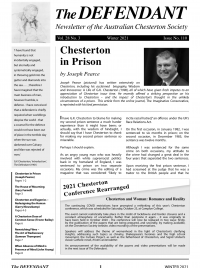John Young, a Melbourne-based philosopher who is a frequent contributor to The Defendant, reflects on a great Chesterton paradox – inspiring to some, infuriating to others – of absence of mind in one sphere of life being a presence of mind in another.
Many thinkers have been absent-minded. St Thomas Aquinas, in a dinner presided over by the king of France, St Louis IX, had a sudden inspiration and shouted out: “That will settle the Albigenses!” The king, being a saint, was not
annoyed, but sent for a scribe to take down St Thomas’s idea.
Adam Smith, the father of economic science, was notorious for his absentmindedness. On one occasion he went out of his house on a Sunday morning and absentmindedly started walking. He came to himself when he heard church bells ringing, and found himself in the next village.
Wilfred Sheed, Frank Sheed’s son, in his book Frank and Maisie: A Dialogue with Parents, mentions his father’s absentmindedness (I was rather surprised to read that Sheed was absent-minded), as when he put both socks on the same foot and then went looking for the other sock.
Chesterton was famous for his absentmindedness, even as a boy. On one occasion at school, the boys, as a joke, put snow in his pockets, and when they went into class the snow, as it melted, dripped on the floor. But Chesterton hadn’t noticed! The laboratory sink was thought by the teacher to be the source of the water, so he sent Chesterton upstairs to ask that it be fixed. Chesterton did so and came back with water still dripping from his pockets, and he still didn’t notice!

One day when he was crossing Fleet Street an idea occurred to him and he stopped in the middle of the road to think about it. And on his wedding day he arrived at the church without a tie.
Chesterton makes an interesting analysis of absent- mindedness, including that of those “whose minds have never been noticeably present”. But there is one kind of absence of mind, he says, which is really a presence of mind. That is the kind that Chesterton had, as did the famous thinkers referred to above.
Aquinas was intent on settling the Albigenses, although it unsettled the guests at the King’s dinner. Adam Smith was perhaps marvelling on the way that the butcher in seeking his own benefit is unconsciously benefiting society. Sheed was possibly reflecting on the sanity of theology.
The tendency to talk to oneself is sometimes associated with this kind of absentmindedness. The joke has it that talking to oneself is an early sign of dementia, but Chesterton said that if you don’t talk to yourself it is because you’re not worth talking to.
Frances Chesterton recalled an occasion, before their marriage, when she was on a holiday with Gilbert and his brother Cecil, and the two brothers spent most of their time arguing amicably. The argument apparently continued into the night: Frances could hear Cecil’s voice in his bedroom next door, so she tapped on the wall and said, “Cecil, do let Gilbert get some sleep!” Cecil answered in an embarrassed voice: “There’s no one here.” Cecil had been arguing with himself.
Surely a serious but overlooked weakness in modern society is the inability of most people to contemplate, which involves talking to oneself. And they compensate for this deficiency with noise, as in so much so-called music. Another distraction is mobile phones. City streets are full of people gazing into their phones as they walk along, as though fascinated by some mystic message.
The basic explanation of the absentmindedness which is really a presence of mind is found, I believe, in our nature as rational animals; that is, beings who have bodies and sense life in common with the lower animals and spiritual souls which give us affinity with the angels.
As Aristotle and St Thomas show, all our knowledge, no matter how sublime, has its beginning in the five senses of touch, sight, hearing, taste and smell. From these the spiritual intellect penetrates into the very nature of things.
The human intellect belongs to the soul alone, not to the compound of soul and body, and the more deeply it penetrates into reality the more detached it is from the mundane details of daily life. The resulting absence of mind is therefore a presence of mind.
